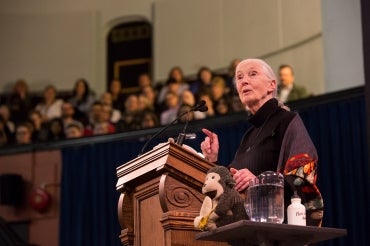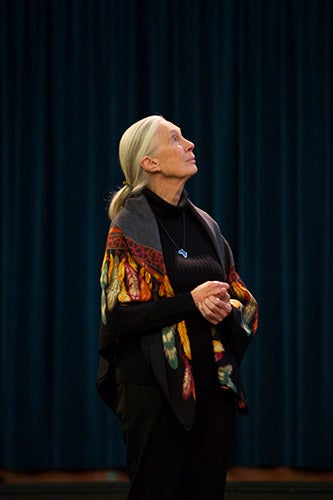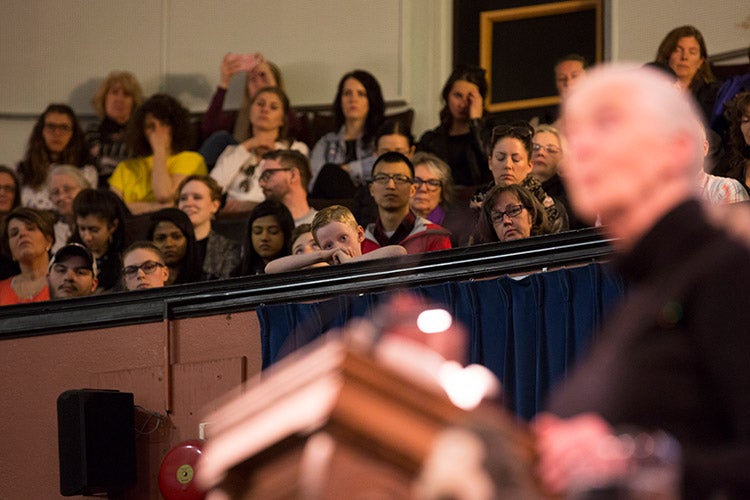Jane Goodall at U of T: 'The forest needs people to defend it desperately. The chimpanzees need people to defend them'

Published: April 23, 2018
Primatologist Jane Goodall came to the University of Toronto over the weekend to mark Earth Day with a discussion about her life, work and the need to protect the planet.
In front of a sold-out audience at Convocation Hall, she recalled her adventures at Gombe Stream Game Reserve (now a national park) and the observations of wild chimpanzees starting in the 1960s. Her eyewitness accounts and analysis of chimp behaviour – their use of tools and their complex social structures – changed people's understanding of their closest cousins.
Goodall, who celebrated her 84th birthday this month, went on to found the Jane Goodall Institute and spends much of the year travelling to raise money and awareness for conservation efforts. Her impact is such that she appeared in cartoon form in the Google doodle for Earth Day.
At U of T, she urged people, particularly youth, to protect the environment before it's too late. “We have a window of time – I don't think it's very big but I think we have a little window – to try and turn things around,” she said. “Every individual makes a difference every day, and we can choose what kind of difference we'd like to make.”
U of T is home to a branch of Roots and Shoots, a youth program started by Goodall in 1991 that fosters respect for all living things.
Sabrina Lau, a graduating student in environmenal studies, environmental biology and history, started the U of T chapter two years ago and travelled to Windsor Castle last summer to brainstorm ideas to promote sustainability with other students from around the world.
Whenever she has heard Goodall speak, Lau says she has left feeling inspired. “Her message is just to have hope and for young people to see this time as an opportunity to take charge and take action.”
Here are some highlights from Goodall's speech:
On her first days in Gombe:
When I got to Gombe the biggest problem was that the chimpanzees ran away every time they saw me. They had never seen a white ape before.
 On first seeing chimps use tools:
On first seeing chimps use tools:
I still can't get over how sad it was that she (her mom, who had accompanied her) had to leave just two weeks before the breakthrough: seeing a chimpanzee, the first to lose his fear of me, break off grass stems and use them to fish termites from their nests.
In addition, I saw him pick leafy twigs and fashion them into tools. He had to remove the leaves and the little side branches…It wouldn't be exciting if you saw that today, but back then it was still thought that humans and only humans used and made tools.
I sent a telegram to (paleoanthropologist and archeologist) Louis Leaky…He sent me back the message: “Now we must redefine ‘tool’, redefine ‘man’, or accept chimpanzees as humans.” That observation enabled him to approach the National Geographic Society and they agreed that they would support my research when the first six months' money ran out.
On chimpanzee power dynamics:
If you look back over time, it's really fascinating to see how the different males get to the top-ranking position using different strategies. And some males rely on aggression. They swagger around, make themselves look big and strong, and remind me of some human politicians who shall remain nameless.
On the dual natures of chimps and humans:
I was very shocked when I discovered that chimps can be extremely violent and brutal, just like us. These inter-community interactions can result in a sort of primitive war, and chimpanzees may be killed. But just like us, they also have a compassionate and truly altruistic side to their nature. It was one of the most wonderful observations at Gombe to see how a completely unrelated adult will adopt a motherless orphan.
On doing her PhD at Cambridge University:
Some (professors), but not all of them, said you mustn't give chimpanzees names, that isn't science. You should give them numbers. And they said you can't talk about chimpanzees having personalities – only humans have personalities. You can't talk about them having minds capable of problem-solving. That's unique to humans.
You certainly can't talk about them having emotions like happiness, sadness, fear, despair – that makes you guilty of the worst form of anthropomorphism, attributing humanlike behaviour to non-human animals. Well fortunately, I had a wonderful teacher when I was a child, a teacher who had taught me that however much these professors had learned, in this respect they were definitely wrong. That teacher was my dog. You can't share your life in a meaningful way with a dog, a cat, a rabbit, a horse, a cow, a bird – I don't care what it is – and not know that of course animals are not so different from humans in these respects.
On becoming an activist:
Then came an event in 1986 that changed everything. There was a conference I helped put together and we brought together the scientists who were studying chimpanzees by that time from about eight different field sites across Africa. The conference was called Understanding Chimpanzees, and its main purpose was discussion between different researchers as to differences in behaviours and similarities.
But we had a session on conservation, and it was absolutely shocking to see everywhere chimps were being studied, forests were being cut down.
On youth apathy and the future:
As I'm travelling around raising awareness I was meeting so many young people in high school and university who didn't seem to have much hope. Young people who were often depressed sometimes deeply depressed. Some were angry, even violent, mostly just apathetic, not seeming to care much about anything.
When I talked to them and asked, "Why do you feel this way?" the reply was more or less the same on all continents: “We feel this way because you've compromised our future.”
Well, we have compromised your future, all of you young people in the audience. There's a saying from one of the North American tribes: We haven't inherited this planet from our parents, we've borrowed it from our children.
We haven't been borrowing your future; we've been stealing it. And it's about time we start to pay back.

On whether she would rather spend her time in nature instead of travelling:
I love being out in the forest but the sad thing is if I could be out in the forest today I wouldn't be happy because I know I'm meant to be doing what I'm doing. I know the forest needs people to defend it desperately. The chimpanzees need people to defend them.
On seeing herself on screen in the National Geographic film, JANE:
I saw many films about me and this documentary was completely different. Indeed it was. It took me back as no other film has to those days when I was 26, out in that pristine Gombe, which is a very different Gombe from today.
On the secret to her longevity:
A scotch a day keeps the doctor away.



